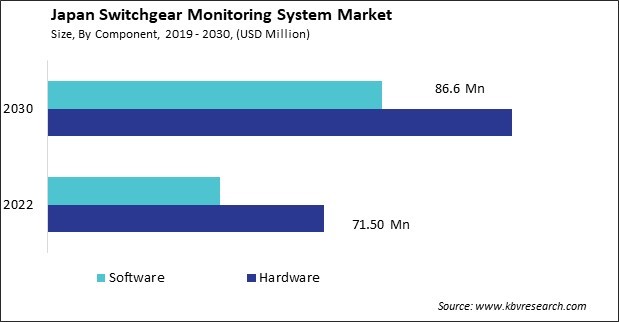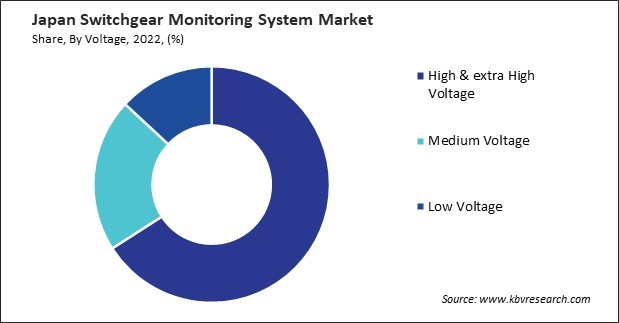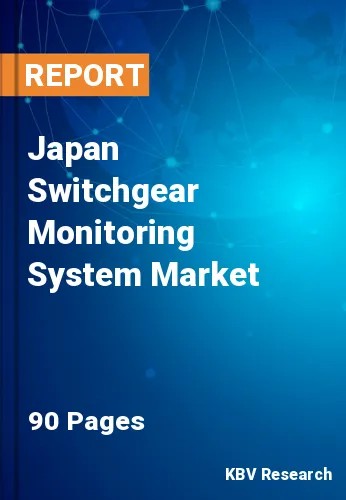The Japan Switchgear Monitoring System Market size is expected to reach $206.8 million by 2030, rising at a market growth of 7.6% CAGR during the forecast period.
Japan's switchgear monitoring system market has experienced significant growth and transformation as it prioritizes modernizing its electrical infrastructure. Japan's advanced technological landscape and commitment to sustainability and energy efficiency have propelled the demand for cutting-edge monitoring solutions in switchgear systems. In terms of industry dynamics, Japanese companies, as well as international players, are actively participating in the switchgear monitoring system market.

As a nation continually seeking innovation and efficiency, Japan's infrastructure modernization efforts are characterized by a commitment to enhancing its electrical grids' reliability, safety, and performance. The deployment of advanced switchgear monitoring systems is a key component of this strategy. The modernization drive is fueled by various factors, including the need for more intelligent and resilient electrical networks to accommodate an increasing electricity demand and integrate renewable energy sources into the grid. Japan's commitment to renewable energy, notably solar and wind power, necessitates adopting sophisticated monitoring solutions to ensure seamless integration and optimal performance.
Japan's vulnerability to natural disasters, such as earthquakes and typhoons, underscores the importance of resilient infrastructure. Switchgear monitoring systems contribute to the overall resilience of the electrical grid by providing early warnings and facilitating quick responses to potential issues. The ability to remotely monitor and control switchgear systems becomes particularly critical in post-disaster scenarios, allowing for efficient restoration of power and minimizing disruptions.
In recent years, the emphasis on Industry 4.0 and the digitalization of infrastructure has further accelerated the adoption of smart technologies in electrical distribution. Switchgear monitoring systems enable real-time monitoring and diagnostics, often equipped with sensors, communication modules, and data analytics capabilities.
Japan's switchgear monitoring system market is witnessing a transformative shift with the integration of renewable energy sources. As Japan seeks to reduce its dependence on traditional fossil fuels and mitigate the impact of climate change, adopting renewable energy technologies has gained momentum. This shift towards a more sustainable energy landscape profoundly impacts the switchgear monitoring system market, which is crucial in ensuring the reliability and efficiency of power distribution networks.
One key driver for incorporating switchgear monitoring systems in Japan's renewable energy sector is managing the intermittent nature of renewable power sources such as solar and wind. While environmentally friendly, these sources challenge grid stability due to their variability. Switchgear monitoring systems offer real-time insights into the performance of electrical components, helping operators optimize the distribution and ensure seamless integration of renewable energy into the grid. Japan's commitment to achieving a carbon-neutral future by 2050 further propels the demand for advanced switchgear monitoring solutions. These systems enhance the power grid's reliability and contribute to the overall efficiency of renewable energy integration, enabling a smoother transition towards a cleaner and more sustainable energy mix.
According to the U.S. Energy Information Administration, Japan has committed to achieving carbon neutrality by the year 2050, with a targeted increase in the share of renewable energy in power generation to reach 36%–38% by 2030. As part of this initiative, the Japanese government has set specific goals for expanding offshore wind power, aiming to add 10 GW by 2030 and substantially increase to 45 GW by 2040. These ambitious targets are expected to drive the growth of Japan's switchgear monitoring system market as the nation seeks to enhance the efficiency and reliability of its electrical infrastructure to accommodate the rising capacity of renewable energy sources.
In recent years, Japan has witnessed a remarkable surge in adopting high-voltage systems within the switchgear monitoring system market. One key driver behind the rise in high-voltage systems is the increasing demand for reliable and robust energy infrastructure. As Japan grapples with the need to modernize its power grid and enhance grid stability, high-voltage systems emerge as a pivotal component in ensuring efficient electricity transmission. These systems enable the seamless transfer of electricity across long distances, minimizing energy losses and enhancing overall grid performance. This is particularly crucial in Japan, where geographical considerations often necessitate electricity transmission over extended distances.
Moreover, the emphasis on renewable energy integration has played a pivotal role in adopting high-voltage systems. With an escalating focus on clean and sustainable energy sources, Japan is integrating a growing share of renewable energy into its power mix. High-voltage systems facilitate the effective integration of renewable sources by efficiently transmitting power from remote renewable energy generation sites to urban centers and industrial hubs.
The need for advanced monitoring and control capabilities in switchgear systems has also fueled the preference for high-voltage solutions. These systems offer enhanced monitoring features, real-time data analytics, and remote-control options, giving operators greater visibility and control over the grid. As Japan aims to build a smart and resilient energy infrastructure, deploying high-voltage systems becomes instrumental in achieving these objectives. Therefore, Japan's surge in adopting high-voltage systems for switchgear monitoring reflects a strategic response to the imperative of modernizing its power grid, ensuring reliability, and integrating renewable energy.

Japan's switchgear monitoring system market plays a crucial role in ensuring electrical power systems' efficient and reliable operation. Mitsubishi Electric, a prominent Japanese multinational, is known for its diversified range of products, including solutions for power systems. Mitsubishi Electric may play a significant role in the switchgear monitoring system market by providing advanced technologies and systems for monitoring and controlling switchgear equipment. Their expertise in electrical systems could contribute to developing reliable and efficient switchgear monitoring solutions tailored to the Japanese industry.
Hitachi is a well-established Japanese conglomerate with a presence in various industries, including power systems. In the switchgear monitoring system market, Hitachi might contribute by offering solutions that enhance the reliability and performance of electrical grids. This could involve the development of intelligent monitoring systems capable of real-time data analysis, predictive maintenance, and remote control of switchgear equipment.
Toshiba, another major player in the Japanese corporate landscape, may have a role in the switchgear monitoring system market. The company's expertise in power systems and technology solutions could lead to the development of advanced monitoring and control systems for switchgear. Toshiba might focus on innovation, aiming to provide solutions that improve power distribution networks' overall efficiency and safety.
Meidensha is a Japanese engineering company that operates in various fields, including power systems and industrial machinery. They may offer solutions related to switchgear and electrical equipment monitoring. Similarly, Fuji Electric is a Japanese company specializing in energy and power electronics products. Their offerings may include power distribution and monitoring systems solutions, potentially encompassing switchgear monitoring.
By Component
By Voltage
By Services
By Type
By End User
Our team of dedicated experts can provide you with attractive expansion opportunities for your business.

